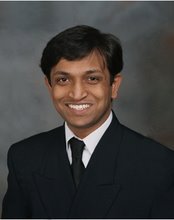Back in my undergrad days, when we were taught the concepts of dynamical systems (it is about how a point's position is varying over time), I first heard about the idea of bifurcation points in physics, which is a point beyond which two paths are the possible for trajectories for the same point. I found it a very interesting concept then because to me it represented some unknown conditions leading to two or more possibilities for the future.
Later when I was reading the Indian philosophical books, Bhagwad Geeta and Upanishads, again and again I found the mention of an obvious phenomenon that choices an individual makes define the future. For the westerners, I would say, in the movie Matrix and its sequels we find this idea being thrown to us quite often. Of course one can find that a lot of work has been done on this topic of choice by many philosophers, epistemologists, economists and science fiction writers etc (broadly speaking, people who want to figure it all out :-).
And recently, while working a paper for my research I had to include some aspects of investment decision making (FYI: as a student I try to do some research also for living and its focus is on economics of innovation or technological change, this is what gives me the money for food :) I have a long list of other research areas also where once in a while I try to write some course paper or do some general readings, it includes: Information and Communication Technologies for Development (ICT4D), environmental sustainability, economic development, evolutionary economics, industrial organization). So the point I wanted to make is, everyone says the same thing that choices made today shape your future tomorrow. Statistically and philosophically these choices do get defined by the interplay of the forces of evolutionary pull and historical past. By the use of words "historical past" I mean that the change which happens over time is path dependent (in simple words, nothing changes suddenly) and evolutionary pull is the evidence of the fact that we are alive, thinking and have desires to change things, and for that at times we do anything required.
This is getting longer and sounding more and more confused now, so I will try to cut short and maybe say precisely what I want to say (which I believe I don't know now). So we find that since the beginning of civilized societies intellectuals have been talking about the importance of choice, we can find many developments in mathematics and economics (evolutionary game theory, decision trees, options theory, etc.) which try to mathematically explain and model this phenomenon. Obviously math as of today can not model this fully but all this just shows the convergence of thoughts over different disciplines, which emphasizes the fact that choice is something very powerful. On a optimistic note, we know that whatever the odds are, we are the ones who make our choices.
Therefore at the level of a simple discussion to share knowledge, so far my understanding of all this in relevance to our everyday lives is a very simple and obvious fact. We need to have a sense of direction in life, or know what we want (the biggest question :-) but in order to acheive that doing our best in present is the best thing we can do. This will decide and lead us to the whichever next set of choices we will have. Hence taking us to the next bifurcation point of our life, from where again different paths are possible. No matter what your choices would be, it is the doing your best in the moment which will make the changes possible. I guess the Bhagwad Geeta's one of the most famous verse puts this idea across in the best possible manner, ""Karmanya Vadhikaraste Ma Phaleshu Kadachana, Ma Karmaphalahetur Bhur Ma Tey Sangostva Akarmani". It means, we can take action so we should do that in best possible way, following results is not what we should be doing and we should never fall for the idea of inaction, that won't take us anywhere.
